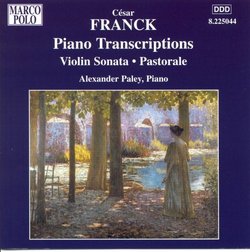| All Artists: Cesar Franck, Alexander Paley Title: Franck Piano Transcriptions: Violin Sonata; Pastorale Members Wishing: 0 Total Copies: 0 Label: Marco Polo Release Date: 10/1/2002 Genre: Classical Styles: Chamber Music, Forms & Genres, Short Forms, Historical Periods, Classical (c.1770-1830), Instruments, Strings Number of Discs: 1 SwapaCD Credits: 1 UPC: 636943504420 |
Search - Cesar Franck, Alexander Paley :: Franck Piano Transcriptions: Violin Sonata; Pastorale
 | Cesar Franck, Alexander Paley Franck Piano Transcriptions: Violin Sonata; Pastorale Genre: Classical
|
Larger Image |
CD Details |
CD ReviewsANOTHER GOOD FRANCK DISC... Sébastien Melmoth | Hôtel d'Alsace, PARIS | 01/07/2007 (5 out of 5 stars) "Franck's piano music--and his works transcribed for piano--form a significant body of art. This disc is a nice combo of original piano pieces and organ works transcribed by Bauer and Cortot; double-plus bonus the Sonata for Violin [or Flute] and Piano in a special transcription for piano solo. The pianist on this recording, Alexander Paley, does a very good job bringing a fresh perspective and insight into these works. His technique is very good. Instead of viewing these pieces as a gestalt, he takes a more deconstructive reading, emphasizing the episodic. He highlights each little episode with unique voicing and expressiveness, making the aesthetic experience a mysterous journey. He plays a Steinway, which sounds sharp, but sometimes a little "tinny." Marco Polo label is produced by Naxos, and used to be its "luxury line"--meaning it was considerably more expensive. It now appears they've come to their senses and priced Polo more wisely. Good idea: produce more, sell more." Franck on an Optimal Medium Hexameron | 10/02/2006 (5 out of 5 stars) "Alexander Paley, an underrated but sometimes uneven pianist, joins the ranks of Stephen Hough and Murray Perahia as a notable exponent of Franck's piano music. Michael Frohnmeyer has also recorded other piano transcription rarities of Franck's lesser-known organ works (Cesar Franck: Piano Works). But the present Marco Polo release is, in my humble opinion, the best investment one can make into Franck's music for piano: his finest keyboard works and the great Violin Sonata, exceptionally arranged by Bauer and Cortot are projected with powerful interpretations by Paley.
Although Franck began his music career as a promising piano virtuoso, he developed a natural and formidable talent for organ playing. While working as a church organist, he cultivated amazing improvisational and compositional powers. The "Prelude, Chorale and Fugue" M. 21 is rightly esteemed for its forcefulness and profundity. But I believe its textures and keyboard writing are better suited to the piano. This work moans with melancholy and dark lyricism that only the piano can properly amplify. Additionally, the piano resplendently clarifies the massive strands of counterpoint and motivic complexities. I also think the violent and spectacular fanfares sound pianistic and better articulated on the piano. I have heard Perahia, Wass and Frohnmeyer, but Paley's robust execution is not only technically adroit; it possesses a gravity and strength not heard from the others. Equally magnificent is the "Prelude, Fugue and Variations" Op. 18. The Prelude emits a mournful air and a melody more haunting than the best of Chopin or Liszt. Paley captures the sudden jolt from sorrow to a stern proclamation in the Lento, which makes way for a serious fugue. Paley's delicate touch and pedaling here is surprising, since I have heard less-than-agreeable results with his Scriabin. Paley also achieves beguiling musicality in the "Pastorale" Op. 19. This introspective and absolutely sublime composition fares much better on the piano medium. In the "Andantino" movement, for instance, the tolling bell-like effects and the nuances of dynamics are exquisitely captured. Paley plays with overt feeling. He also conveys the quirky rhythms and grandeur of the "Quasi Allegretto," reminiscent of Alkan, with gusto. It is interesting that Harold Bauer, a stellar pianist who studied with Paderewski, was first and foremost a violinist, but he did not attempt to transcribe Franck's "Violin Sonata." Instead, the honor fell to the great Alfred Cortot, renowned as one of the great Golden Age pianists and an indomitable Chopinist. Cortot's transcription of Franck's Violin Sonata is monumental. Even after knowing the original Violin Sonata, this arrangement convinces me that Franck's Sonata does not suffer and is self-sufficient without the violin. Cortot's pianistic reworking and Paley's energy and thunder allow the "Allegro" movement to shimmer with intensity. In the brooding "Recitativo-Fantasia," Cortot reinforces the piano accompaniment and sonority without harming the integrity of the main theme. Throughout this masterpiece, Paley conjures feelings of agony and heroic stoicism that other pianists fail to generate. Bottom line: Sonically, this music just sounds better for solo piano. Harold Bauer's transcriptions have turned these organ masterpieces into pianistic powerhouses: all of Franck's intellectual ideas seem magnified and the emotional impact heightened. Cortot's transcription of the "Violin Sonata" is a colossal success and Paley's rendition the best I've heard." |

 Track Listings (13) - Disc #1
Track Listings (13) - Disc #1